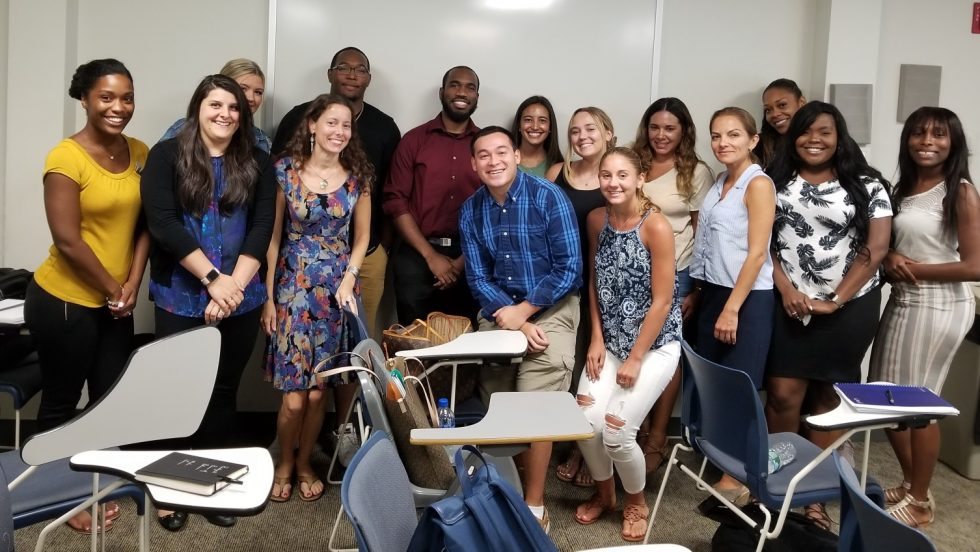
In the Fall of 2018, the Derner School of Psychology welcomed its first ever Psy.D. in School Psychology cohort. There are 15 students now studying in this program, training in psychothera-py, prevention, systemic-level intervention, and assessment, as well as conducting research.
In the Fall of 2018, the Derner School of Psychology welcomed its first ever PsyD in School Psychology cohort. There are 15 students now studying in this program, training in psychothera-py, prevention, systemic-level intervention, and assessment, as well as conducting research.
Dr. Jennifer Durham, Coordinator of the PsyD in School Psychology described the origin of the program to lie in the need for more expert clinicians in the field. She said, “There is a need for clinicians trained at the doctoral level. There are not enough clinicians and not enough kids have access to great clinicians. We thought, what a difference more well-trained clinicians would make.”
The new PsyD program builds on the existing expertise developed over many years among the faculty of the M.A. in school psychology program. Once the idea of adding doctoral-level training was generated, it took approximately 9 years to bring this vision to fruition. The development of the program was spearheaded by Dr. Ionas Sapountzis, director of school psychology programs at Derner, and the core team working to build the program were Dr. Durham, Dr. Sapountzis, and Dr. Dana Boccio. Additionally, Dr. Durham reported that the project was supported at the university level and embraced by Dr. Jacques Barber and the Derner administration.
One aspect of Derner’s PsyD in School Psychology program that sets it apart from other doctoral-level school psychology programs is its commitment to social justice. Dr. Durham described a program with social justice integrated into every course, as well as represented in colloquia, special events, clinical training placements, and research. She said that she sees the program to have the potential to be a place “where research and and scholarship are generating best practices with respect to the interface of psychology and social justice.”
This aim is illustrated by Dr. Durham’s own research group, the Clark Study and Consultation Circle. The Clark Circle is named after Drs. Kenneth and Mamie Clark, known for their research on the internalization of racism by African-American children and their testimony before the Supreme Court, which helped secure the Brown vs. Board of Education ruling that declared de jure racial segregation of schools unconstitutional. Dr. Durham’s research group similarly aims to combine research with advocacy and practice.
The Clark Circle is currently conducting a study in Atlantic City, New Jersey, examining children’s unconscious biases against self through use of an implicit bias assessment measure and grounded theory qualitative interviewing. They have a participatory action research approach, emphasizing action to support positive change in the communities studied and collaboration with community members. For example, in addition to the study described, Clark Circle members are also conducting workshops with parents in Atlantic City, addressing topics such as positive identity development and racial socialization.
The new PsyD in school psychology also stands out for a reason shared by other programs at Derner: training in a broadened range of approaches to conceptualizing psychological life, including psychodynamic approaches. According to Dr. Durham, “Most school psychology programs are behavioral in focus. We’re very different. Our students learn behavioral methods, but they’re also exposed to other ways to conceptualize children.” Along with training in psychodynamic approaches, the curriculum is also broadened through an emphasis on ecological conceptualizations of children, which take into account environmental and societal influences on child development and functioning.
In closing, when asked about her hopes for the future of doctoral-level school psychology training at Derner, Dr. Durham said “I would like the program to train experts in culturally-competent treatment for kids, families, and communities. This place should be a hub for that. Churning out great clinicians to go out and help is our goal.” Based on the thoughtful and unique design of the program, and the Derner School of Psychology’s existing expertise in training school psychologists, the PsyD in School Psychology seems positioned to achieve the aspirations Dr. Durham described.
For more information on the Derner School of Psychology PsyD in School Psychology, please visit https://derner.adelphi.edu/psychology/school-psyd/